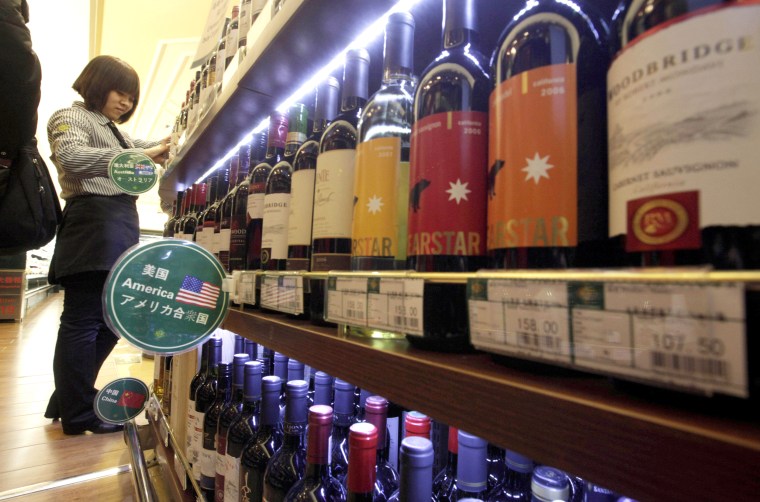LIVERMORE, Calif. — Nearly 5,000 cases of wine once destined for China have been sitting in a warehouse here for two weeks.
It's not that no one overseas wants them, said Michael Parr, vice president of international sales for the family-owned Wente Vineyards. Rather, the stranded bottles are a glaring reminder of how a potential trade war brewing between the U.S. and China has trapped dozens of industries, including wine producers, in an economic vise that is beyond their control.
For now, anxious Chinese importers are telling Parr, "Let's wait and see before you ship."
But Parr can't wait. He plans to send the wine to local liquor stores instead.
"China is an extremely important market to us, both because of the investments we have made and what we hope to make," Parr said. "We will feel the impact of this."
Among the list of 128 products that China announced this week are now subject to a tariff are American-made wines. Overall, U.S. wine exports to China and Hong Kong were worth $197 million last year, according to the Wine Institute, a San Francisco-based trade group. It's a small sliver of U.S. wine sales, but there's untapped potential because of the appetite of China's higher-end consumer, industry experts say.
Parr said his winery, located about an hour east of San Francisco, began exporting to China in 1994. As China's growing economy began to look beyond France and Chile and Australia to demand wines from the Napa Valley and its neighbors, the business has benefited — so much so that Wente markets to Chinese tour groups and has a wine delivery service on WeChat, the popular Chinese app.
Robert Koch, the Wine Institute's chief executive, said in a statement, "These tariffs put our products at a price disadvantage and we urge swift resolution of this issue before long-term disruptions are felt."

A 15 percent tariff is being added to wines on top of a pre-existing tariff and tax, pushing the total levies on a U.S. bottle from about 48 percent to nearly 68 percent. Competitors such as New Zealand and Chile don't have tariffs because of free-trade agreements and pay a smaller 27 percent tax rate, making them more attractive to Chinese importers.
"We are a very small market share, so it's easy for [the Chinese] to select an alternative brand to California," Parr added. "That's one thing that's very dangerous for us."
China's retaliatory charges come after the Trump administration in March announced that it was leveling its own tariffs — now worth about $150 billion — against Chinese goods, including aluminum and steel, to punish the country for what Washington calls theft of U.S. intellectual property.
A list of 1,300 Chinese-imported products to be slapped with a 25 percent tariff was released this week, and it includes items used in the manufacturing of larger goods, such as cars and airplanes, as well as appliances, electronics and other random merchandise — flamethrowers, dental fillings, golf carts.
Larry Kudlow, director of the National Economic Council under President Donald Trump, downplayed any dread that a trade war is escalating, telling reporters Friday that the trade penalties are still only proposals and will not go into effect until a 60-day public comment period is over.
Trump warned in a radio interview that the trade actions against China could cause some "pain." Wall Street remains spooked over the uncertainty, and stocks fell sharply later Friday.
The unknown fallout from the trade actions, particularly the tariffs, has a range of companies wondering how their supply chains might be affected and consumer groups asking if manufacturers and businesses will pass down costs to their customers.
"How much of this is bluster and how much of it is real?" asked Jim Willcox, a senior electronics editor at Consumer Reports. "And is it a short-term tariff or a long-term one?"
"Consumers could take a hit in the short term, but in the long term, companies might find new sources other than China for their components," he added in an interview. "So we might not see any of this play out until the fall, when we start seeing the impact."
He noted that in 1987, the Reagan administration imposed a 100 percent tariff on Japanese electronics. The costs at the time to U.S. consumers led some products, such as memory chips, to double in price.
"No one believes it will have that same effect now," Willcox said.
But that doesn't mean that America's producers aren't feeling the angst.
Soybean growers across the U.S. targeted by Beijing's tariffs say they're concerned that their clients in China — the industry's top export market — will cut down shipments.
Another business owner, Paul Czachor, the CEO of Pennsylvania-based American Keg Co., said he's worried that tariffs on Chinese steel mean that he'll have to look to more expensive U.S. steel for his keg products.
While he said he supports Trump's desire to save American manufacturing jobs, he worries about his own future after having to cut his workforce from 30 people to 20 in February because of costs.
When he looked at the list of Chinese products that will be subject to U.S. tariffs, he was disappointed to see that "kegs" weren't on there. He's losing customers, and fears that U.S. steel costs will burden his company — currently the last domestic company making stainless-steel beer kegs.
"This will put us in jeopardy," Czachor said.
Chiara Sottile reported from Livermore, and Erik Ortiz from New York.
